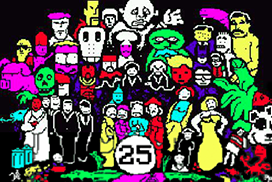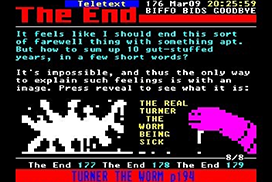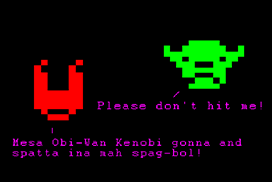
Grumble feature enabled

|
Pretty vacant
Edge #155, November 2005
I was born about seven years too late to get caught up in the punk movement. Circa 1977, the closest I got to anarchy was putting an elastic band in my teacher's coffee, and altering the Lord's Prayer during assembly (incidentally, "Our Father who arse in Devon, Billy be thy name" got me a morning outside Mrs Kemp's office to contemplate all the nice things God had ever done).
Talking of fictional deities, I've been playing Sony's God Of War recently. Beautifully balanced difficulty level; just enough longevity, without outstaying its welcome; sublime controls... As far as thirdperson hack 'em up adventures go it's everything you could ever want. Except for the fact it isn't even remotely original. Indeed, as much as I enjoy God Of War, it's somewhat indicative of the inspirational malaise that appears to have clamped itself to the very loins of this business.
Don't get me wrong: games have never been more polished. Cast your eyes across the landscape and you'll see Captain Quality striding across field and stream, flashing his eerily oiled thighs at girls and boys, young and old. But the Creativity Donkey is stumbling around its paddock, bleeding from the snout and anus, its braying reduced to a bleak rasp. How did the donkey end up in this state? Captain Quality beat him with a briefcase.
Games have become sterile and passionless. With precious few exceptions the rough edges have been filed off. Heck, even Japan seems to be playing things safe, with the likes of Killer 7 now the exception rather than the rule. Everything is so achingly cautious, swaddled in corporate conservatism, that we've forgotten how punk the games industry used to be.
In the '80s anyone with a Spectrum, and a vague understanding of machine code, could become the next Bitmap Brothers or Matthew Smith. Alas, those youthful visionaries have either left the industry or become bloated and middle-aged, swallowed up by the apparatus of management. Or they're holed up on a farm with more sheep than is strictly healthy. Modern game development is an almighty juggernaut driven by a man in a suit, and any hint of a risky idea is crushed underneath.
Given that the individual voice has been replaced by a collective hive mind, the industry is not currently structured in a way that allows - or can afford — individualism. Character is being forced out (and by 'character' I don't mean identikit musclemen, anthropomorphised vermin or impractically busty adventuresses).
Alas, there's no sign of individuality coming to the fore in the first wave of Xbox 360 and PlayStation 3 games. Once again, it's the graphics which get hyped up, rather than the game beneath the pretty pictures. Wouldn't it be joyous if, just for once, a new console was launched with the words "You're going to experience types of gameplay which we guarantee you will have never seen before", rather than the usual, tiresome "It's like being in movie!!!!" clichés? Unfortunately, while things remain set up as they are, that's never going to happen.
Oh, it's all well and good publishers stating that people don't buy games outside of the safe genres — the sport, the driving, the firstperson shoot 'em ups. But when that's all we're being offered to eat, what choice do we have?
The rest of the entertainment world appears to be faring much better. In broadcasting, technology is freeing up that punk ethic, rather than smothering it with a voluminous stomach. If you've ever seen the excellent Consolevania, or listened to a podcast, you'll know there's already a viable alternative to mainstream broadcast coverage of videogames - produced by people with enthusiasm and a screw-you attitude. People are beginning to create the sorts of broadcast entertainment they want to see.
"I have a great idea for a videogame - how do I go about getting it made?" is a query any game journalist will be familiar with. It's easy to dismiss, but how many 'great ideas' are being missed because it's virtually impossible to get them to the people that matter? You know: ideas by people who understand the potential of games, but who might not have the requisite computer programming degree?
While I fully appreciate that technology is at a level where it isn't practically feasible for the lone computer freak to create a title in his bedroom, it's essential that the industry finds a way to tap into that homebrew ethic. TV companies and film studios employ script readers to go through unsolicited submissions. They get thousands every day, but I guarantee you that every single script gets read. They know that new talent is their oxygen, and to let the next Russell T Davies or Paul Abbot slip through their fingers would be beyond disaster.
Talent is the lifeblood of any creative industry, and, at the risk of sounding macabre, the blood in the talent pool must be kept fresh. As it stands, the games industry pool is at risk of stagnating. Why, there's already a pair of soiled underpants floating in it.
Mr Biffo co-founded Digitiser, Channel 4's Teletext-based videogames section, and now writes mainly for television
Do you know of any important moments from the annals of Digi history that have been omitted? If so, then mail me (superpage58@gmail.com) right now, man. Credit will be duly given for anything that gets put up.








